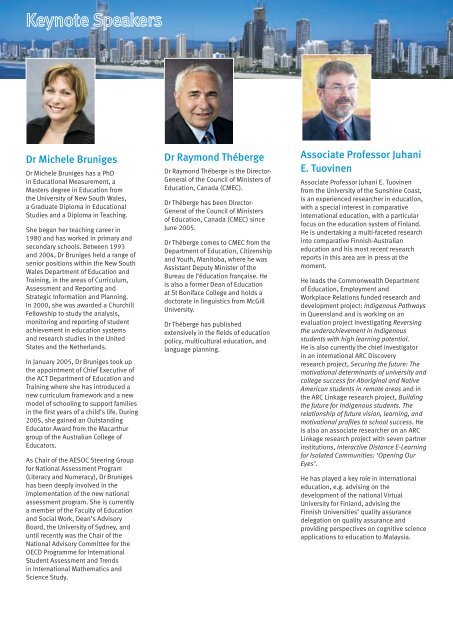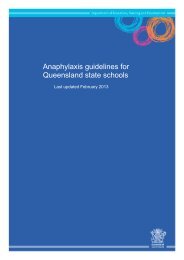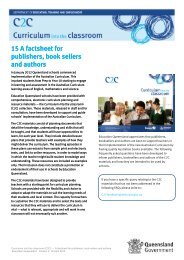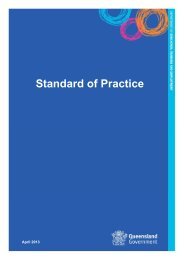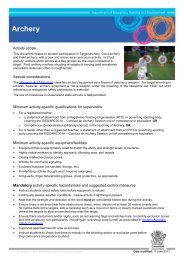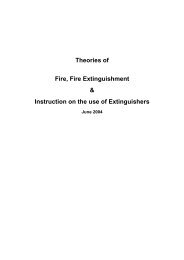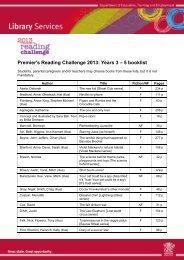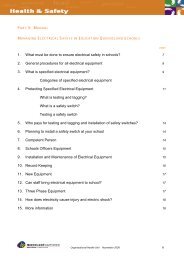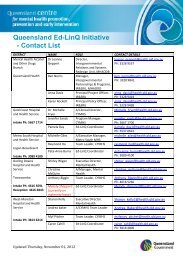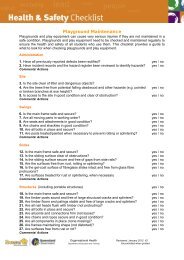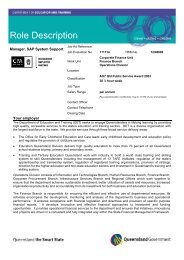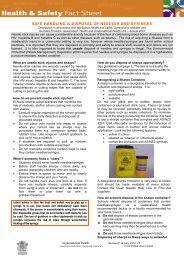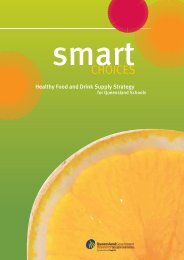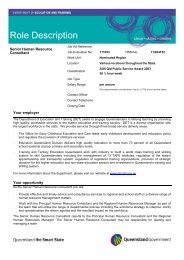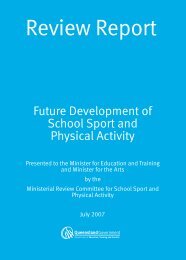Dr Michele Bruniges - Education Queensland
Dr Michele Bruniges - Education Queensland
Dr Michele Bruniges - Education Queensland
You also want an ePaper? Increase the reach of your titles
YUMPU automatically turns print PDFs into web optimized ePapers that Google loves.
<strong>Dr</strong> <strong>Michele</strong> <strong>Bruniges</strong><br />
<strong>Dr</strong> <strong>Michele</strong> <strong>Bruniges</strong> has a PhD<br />
in <strong>Education</strong>al Measurement, a<br />
Masters degree in <strong>Education</strong> from<br />
the University of New South Wales,<br />
a Graduate Diploma in <strong>Education</strong>al<br />
Studies and a Diploma in Teaching.<br />
She began her teaching career in<br />
1980 and has worked in primary and<br />
secondary schools. Between 1993<br />
and 2004, <strong>Dr</strong> <strong>Bruniges</strong> held a range of<br />
senior positions within the New South<br />
Wales Department of <strong>Education</strong> and<br />
Training, in the areas of Curriculum,<br />
Assessment and Reporting and<br />
Strategic Information and Planning.<br />
In 2000, she was awarded a Churchill<br />
Fellowship to study the analysis,<br />
monitoring and reporting of student<br />
achievement in education systems<br />
and research studies in the United<br />
States and the Netherlands.<br />
In January 2005, <strong>Dr</strong> <strong>Bruniges</strong> took up<br />
the appointment of Chief Executive of<br />
the ACT Department of <strong>Education</strong> and<br />
Training where she has introduced a<br />
new curriculum framework and a new<br />
model of schooling to support families<br />
in the first years of a child’s life. During<br />
2005, she gained an Outstanding<br />
Educator Award from the Macarthur<br />
group of the Australian College of<br />
Educators.<br />
As Chair of the AESOC Steering Group<br />
for National Assessment Program<br />
(Literacy and Numeracy), <strong>Dr</strong> <strong>Bruniges</strong><br />
has been deeply involved in the<br />
implementation of the new national<br />
assessment program. She is currently<br />
a member of the Faculty of <strong>Education</strong><br />
and Social Work, Dean’s Advisory<br />
Board, the University of Sydney, and<br />
until recently was the Chair of the<br />
National Advisory Committee for the<br />
OECD Programme for International<br />
Student Assessment and Trends<br />
in International Mathematics and<br />
Science Study.<br />
<strong>Dr</strong> Raymond Théberge<br />
<strong>Dr</strong> Raymond Théberge is the Director-<br />
General of the Council of Ministers of<br />
<strong>Education</strong>, Canada (CMEC).<br />
<strong>Dr</strong> Théberge has been Director-<br />
General of the Council of Ministers<br />
of <strong>Education</strong>, Canada (CMEC) since<br />
June 2005.<br />
<strong>Dr</strong> Théberge comes to CMEC from the<br />
Department of <strong>Education</strong>, Citizenship<br />
and Youth, Manitoba, where he was<br />
Assistant Deputy Minister of the<br />
Bureau de l’éducation française. He<br />
is also a former Dean of <strong>Education</strong><br />
at St Boniface College and holds a<br />
doctorate in linguistics from McGill<br />
University.<br />
<strong>Dr</strong> Théberge has published<br />
extensively in the fields of education<br />
policy, multicultural education, and<br />
language planning.<br />
Associate Professor Juhani<br />
E. Tuovinen<br />
Associate Professor Juhani E. Tuovinen<br />
from the University of the Sunshine Coast,<br />
is an experienced researcher in education,<br />
with a special interest in comparative<br />
international education, with a particular<br />
focus on the education system of Finland.<br />
He is undertaking a multi-faceted research<br />
into comparative Finnish-Australian<br />
education and his most recent research<br />
reports in this area are in press at the<br />
moment.<br />
He leads the Commonwealth Department<br />
of <strong>Education</strong>, Employment and<br />
Workplace Relations funded research and<br />
development project: Indigenous Pathways<br />
in <strong>Queensland</strong> and is working on an<br />
evaluation project investigating Reversing<br />
the underachievement in Indigenous<br />
students with high learning potential.<br />
He is also currently the chief investigator<br />
in an international ARC Discovery<br />
research project, Securing the future: The<br />
motivational determinants of university and<br />
college success for Aboriginal and Native<br />
American students in remote areas and in<br />
the ARC Linkage research project, Building<br />
the future for Indigenous students. The<br />
relationship of future vision, learning, and<br />
motivational profiles to school success. He<br />
is also an associate researcher on an ARC<br />
Linkage research project with seven partner<br />
institutions, Interactive Distance E-Learning<br />
for Isolated Communities: ‘Opening Our<br />
Eyes’.<br />
He has played a key role in international<br />
education, e.g. advising on the<br />
development of the national Virtual<br />
University for Finland, advising the<br />
Finnish Universities’ quality assurance<br />
delegation on quality assurance and<br />
providing perspectives on cognitive science<br />
applications to education to Malaysia.
<strong>Dr</strong> Andrew Fuller<br />
Andrew has recently been described as an<br />
“interesting mixture of Billy Connolly, Tim<br />
Winton and Frasier Crane” and as someone<br />
who “puts the heart back into psychology”.<br />
As a clinical psychologist, Andrew Fuller<br />
works with many schools and communities<br />
in Australia and internationally,<br />
specialising in the wellbeing of young<br />
people and their families. He is a Fellow<br />
of the Department of Psychiatry and the<br />
Department of Learning and <strong>Education</strong>al<br />
Development at the University of<br />
Melbourne.<br />
Andrew has been a principal consultant to<br />
the national drug prevention strategy REDI,<br />
the ABC on children’s television shows, is<br />
an Ambassador for Mind Matters and is a<br />
member of the National Coalition Against<br />
Bullying.<br />
The concept of “resilience” offers a<br />
coherent framework for the creation<br />
of schools that are sensitive to the<br />
developmental needs of young people<br />
and their teachers. As Andrew describes,<br />
resilience is “the happy knack of being able<br />
to bungy jump through the pitfalls of life -<br />
to rise above adversity and obstacles.”<br />
He is the author of Tricky Kids, Guerilla<br />
Tactics For Teachers, Help Your Child<br />
Succeed At School, Raising Real People<br />
(ACER), From Surviving To Thriving (ACER),<br />
Work Smarter Not Harder And Beating<br />
Bullies. Andrew has also co-authored<br />
a series of programs for the promotion<br />
of resilience and emotional intelligence<br />
used in over 3500 schools in Britain and<br />
Australia called The Heart Masters.<br />
Andrew has established programs for the<br />
promotion of mental health in schools,<br />
substance abuse prevention, and the<br />
reduction of violence and bullying, suicide<br />
prevention programs and for assisting<br />
homeless young people. Andrew continues<br />
to counsel young people.<br />
<strong>Dr</strong> Chris Sarra<br />
<strong>Dr</strong> Chris Sarra hails from Bundaberg in<br />
<strong>Queensland</strong>. The youngest of 10 children,<br />
Chris experienced first-hand many of<br />
the issues faced by Indigenous students<br />
throughout their schooling.<br />
He completed a Diploma of Teaching, a<br />
Bachelor of <strong>Education</strong> and a Master of<br />
<strong>Education</strong>. In recent years Chris completed a<br />
PhD in Psychology with Murdoch University.<br />
In the late 1990’s Chris took on the<br />
challenges of Indigenous education as the<br />
Principal of Cherbourg State School in South<br />
East <strong>Queensland</strong>.<br />
Through strong leadership and clear<br />
vision he facilitated many changes at the<br />
school which saw increasing enthusiasm<br />
for student learning through dramatically<br />
improved school attendance and increased<br />
community involvement in education.<br />
Under <strong>Dr</strong> Sarra’s leadership the school<br />
became nationally acclaimed for its pursuit<br />
of the Strong and Smart philosophy.<br />
He has been the recipient of many awards<br />
and much recognition as his ideas,<br />
enthusiasm and vision have taken hold<br />
nationally and internationally.<br />
<strong>Dr</strong> Sarra is now the Executive Director of the<br />
Indigenous <strong>Education</strong> Leadership Institute<br />
which is pursuing improved educational<br />
outcomes for Indigenous children through<br />
engagement with principals, teachers,<br />
community leaders and Government.<br />
The Institute’s work is based on the Strong<br />
and Smart philosophy which espouses a<br />
strong and positive sense of what it means<br />
to be Aboriginal in today’s Australian<br />
society and that Indigenous students can<br />
achieve outcomes comparable to other<br />
students.<br />
<strong>Dr</strong> Sarra believes that the power teachers<br />
have to inspire their students should never<br />
be underestimated. These are messages<br />
that Chris Sarra has drawn from his own life<br />
- as an Indigenous child, student, teacher,<br />
parent, principal and leader.<br />
<strong>Dr</strong> Chris Ryan<br />
Chris Ryan was awarded a Bachelor of<br />
Commerce, with honours in Economics<br />
from the University of Melbourne in<br />
1982, a Master of Economics from<br />
the Australian National University in<br />
1986 and a PhD in economics from the<br />
University of Melbourne in July 2001.<br />
His PhD looked at how to test between<br />
human capital and screening theories<br />
of the role of education in the labour<br />
market.<br />
He was employed in Commonwealth<br />
government agencies, primarily in the<br />
employment, education and training and<br />
primary industries portfolios for 13 years.<br />
He was a member of the Senior Executive<br />
Service between 1992 and 1996, holding<br />
Senior Executive Service positions in two<br />
portfolios.<br />
Since that time, he has undertaken his<br />
PhD, held research and administrative<br />
positions in Australian universities and<br />
worked as a consultant.<br />
In 2002, he was awarded an Australian<br />
Post-Doctoral Fellowship by the<br />
Australian Research Council to undertake<br />
research between 2003 and 2005<br />
on the role of literacy and numeracy<br />
in explaining the education, training<br />
and labour market outcomes of young<br />
Australians. Since 2005, <strong>Dr</strong> Ryan has<br />
been Director of Social Policy Evaluation,<br />
Analysis and Research Centre, Research<br />
School of Social Sciences, Australian<br />
National University.


